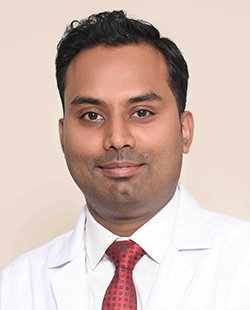Neurosurgery services:
- Diseases of the brain, like brain tumors, vascular anomalies including aneurysms, AV malformations, and cavernoma of the brain.
- Functional neurosurgical procedures for refractory epilepsy, movement disorders, and Parkinson’s disease
- Diseases of the spine, like spinal cord tumors and congenital malformations of the spine (spina bifida, tethered cord syndrome, craniovertebral anomalies, and Arnold-Chiari malformations)
- Degenerative disorders of the spine include cervical disc prolapse, lumbar disc prolapse, cervical and lumbar spondylosis, and deformity of the spine.
- Brain and spine trauma and brain stroke.
- 6. Minimally invasive spine surgeries like endoscopic discectomies, endo-fusion, and percutaneous fixation of the spine for trauma and deformities
- Endoscopic brain surgeries for hydrocephalus, intraventricular tumors, trigeminal neuralgia, pituitary tumors, and CSF rhinorrhea.
- Neurovascular interventions include coiling of aneurysms and AV malformations of the brain, stenting of the internal carotid artery, mechanical thrombectomy, catheter-assisted thrombolysis for brain stroke patients, and tumor embolization procedures for brain and skull base tumors.
- Most advanced skull base surgeries for diseases of the skull base pathologies like infections, tumors, paraganglioma, and trauma.
NEUROSURGERY SUBSPECIALTIES
Technological Advancements
- Intraoperative MRI
- Computer-assisted brain surgery
- Stereotactic radiosurgery
- Deep brain stimulation
- Stereotactic computer-assisted neurosurgery
- Endoscopes
- Exoscope
Conclusion:
Common Procedures Neurosurgeons Perform
Anterior Cervical Discectomy
Epilepsy Neurosurgery
Craniotomy
Other common procedures neurosurgeons perform
- Chiari Decompression
- Laminectomy
- Lumbar Puncture
- Spinal Fusion
- Microdiscectomy
- Ventriculostomy
- Ventriculoperitoneal Shunt
TREATMENTS OF NEUROSURGERY
Types of brain surgery include:
- Aneurysm repair
- Tumor removal
- Trauma repair
- Brain bleed (hemorrhage) stoppage
- Shunt insertion
Types of peripheral nerve surgery include:
- Carpal tunnel release
- Ulnar nerve release
- Vagus nerve stimulation
Types of spine surgery include:
- Stereotactic spine radiosurgery
- Diskectomy
- Laminectomy
- Spinal fusion
- Vertebroplasty and kyphoplasty
- Spine stabilization and reconstruction
- Congenital defects
- Epilepsy
- Spinal defects
- Nerve trauma
- Stroke
- Brain tumours
- Neurofibromatosis
- Hospice and palliative medicine
- Neuromuscular medicine
- Sleep disorders
- Vascular neurology
- Intellectual disabilities
Common disorders that Neuro-oncology specialists deal with
- Acoustic neuromas
- Astrocytomas
- Choroid plexus tumours
- Craniopharyngiomas
- Glioblastomas
- Ependymomas
- Low-grade gliomas
- Meningiomas
- Neoplastic meningitis
- Neurologic complications of cancer
Conditions addressed include movement disorders like essential tremor, Parkinson’s disease, and dystonia; chronic pain conditions such as chronic back pain, complex regional pain syndrome, trigeminal neuralgia, trigeminal neuropathic pain, diabetic neuropathy, and cancer-associated pain; spasticity disorders like cerebral palsy, spinal cord, or nerve injuries; and psychiatric disorders such as obsessive-compulsive disorder and treatment-resistant depression.
- Aneurysms
- Arteriovenous malformations
- Cavernous malformations
- Stroke
Some of the common neurotraumas patients experience
Head Trauma
- Concussion
- Mild TBI
- Moderate TBI
- Severe TBI (typically involves a coma)
- Penetrating brain injury (such as a gunshot, stab wound)
- Depressed skull fracture
Spine Trauma
- Spinal cord injury
- Craniocervical spine injury
- Cervical spine injury
- Thoracic spine injury
- Lumbosacral spine injury
- Atlanto-occipital dissociation
Spinal Surgery Distinguishing themselves from orthopaedic spine surgeons, the best neurosurgeon in vijayawada, specializing in spinal surgery, conducts procedures within the spinal canal lining. These adept neurosurgeons focus on treating neurological disorders, including spinal cord tumors, syringomyelia, and Chiari malformation.
BOOK AN APPOINTMENT
Meet Our Specialists

- Dr. Sridhara Narayana Vuddagiri
- MBBS, MCh (NIMS), Clinical Fellowship in Epilepsy Surgery (U of C, Canada)
- Consultant Neurosurgeon

Dr. Sridhara Narayana Vuddagiri
Qualifications: MBBS, MCh (NIMS), Clinical Fellowship in Epilepsy Surgery (U of C, Canada)
Occupation: Consultant Neurosurgeon
Expertise: • Epilepsy Surgery (Adult & Pediatric) • Endoscopic Skull Base Surgery • Cerebrovascular Surgery • Neuro-Oncology • Hydrocephalus & Neuroendoscopy • Spinal Disorders & Tumors
Years Of Experience: 10+
Education & Qualifications: • MBBS - Andhra Medical College, Visakhapatnam. • M.Ch. (Neurosurgery) - Nizam’s Institute of Medical Sciences (NIMS), Hyderabad. • Epilepsy Surgery Fellow - University of Calgary, Canada (2016–2017)
Publication & Certifications: Dr. Vuddagiri has contributed to numerous national and international journals and conferences. Selected publications include: • British Journal of Neurosurgery – Fusion of vertebral bodies in OPLL • Neurology India – Dorsal cord migration post-laminectomy • International Journal of Neurology & Neurosurgery – Silent corticotroph adenoma • Med J DY Patil University – Diagnostic dilemmas in suprasellar lesions.
Experience: • Present working as Consultant Neuro Surgeon at Kamineni Hospitals, Vijayawada. • Head, Department of Neurosurgery ASRAM Medical College, Eluru (2023 – 2025.) • Consultant Neurosurgeon, Assure Multispecialty Hospital, Vijayawada (2020–2025) • Consultant Neurosurgeon, Nagarjuna Hospital, Vijayawada (2017–2021) • Assistant Professor, Neurosurgery, KIMS Karad, Maharashtra (2016) • Assistant Professor, Neurosurgery, ASRAM Eluru (2014–2015)
More Info: • Kirlampudi Gold Medal – Best Clinical Surgeon, 2007–08, Andhra Medical College • Organized ASRAM Neurocon 2015, National Neurosurgery Conference
Doctor Talks

Headache: Could It Be a Brain Tumor?
Brain Stroke Symptoms and Treatment
Patient Talks

Media & News

Stay updated! Browse our Media & News releases for exclusive insights through our thoughtfully crafted press releases.











